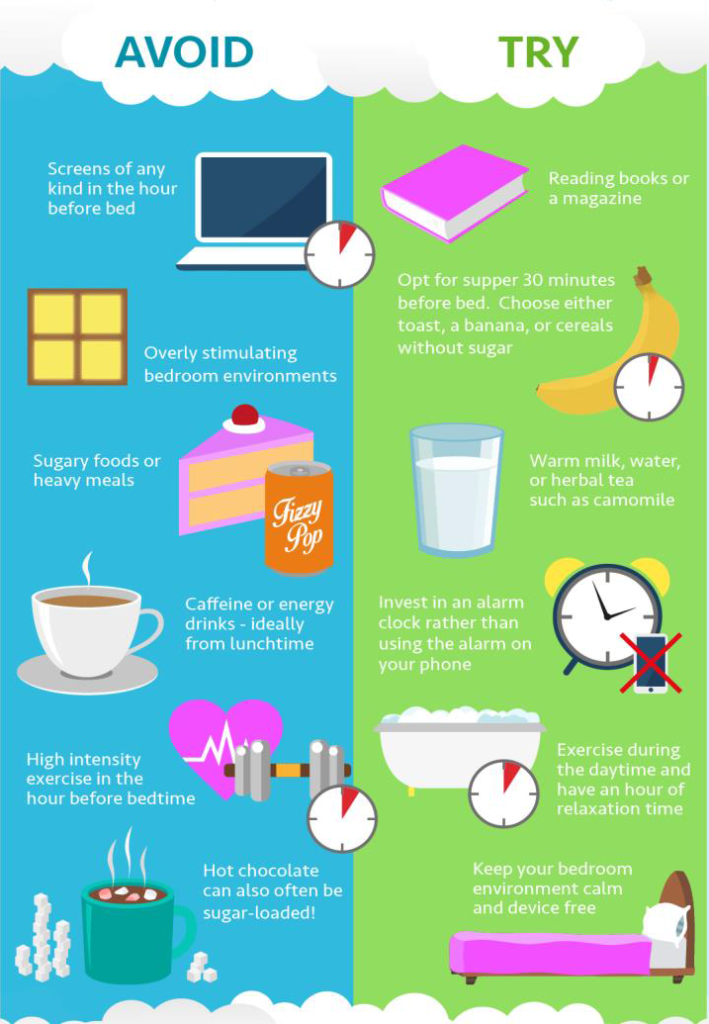All of us need a good night’s sleep because our brains don’t work well if we don’t. Lack of sleep can affect our: Learning, memory, concentration, accuracy, alertness, maths, logic, mood, health and eyes! Just an extra hour of sleep can help improve all of these. The brain does remarkable things while we’re asleep so try these tips to get some ZZZ’s.
- Avoid afternoon napping. If you need to nap, keep it short and before 5.00pm.
- Avoid night time usage of electronics as this can increase anxiety and depression, and reduce self-esteem.
- Write down a list of things to remember the next day.

All of us need a good night’s sleep because our brains don’t work well if we don’t. Lack of sleep can affect our:
- Learning, memory, concentration, accuracy, alertness, maths and logic.
- Mood; making us feel dopey and very grumpy!
- Health; such as increase the risk of weight gain and diabetes.
- Eyes; making them feel gritty
Just an extra hour of sleep can help improve all of these. The brain does remarkable things while we’re asleep – it practices what we were doing during the day. More sleep means brains our work better.
How to Help with Sleep
For ALL children:
- Make a child’s bedroom cool, quiet, dark and comfortable. If they stare at the clock turn it away from them. Tidy away day-time activities.
- Keep consistent bedtimes and wake times every day of the week. Late weekend nights or sleeping-in can throw off a sleep schedule for days.
- Establish downtime or a pre-sleep routine. Encourage at least half an hour of downtime before bed, without electronics. This could be as simple as reading a book, having a chat about the day or having a bath.
- Have some physical exercise as a part of their day, as this often helps with sleep time many hours later.
- If a child is awake in bed tossing and turning, get them get out of bed to do a low stimulation activity such as reading or listening to GENTLE music and then go back to bed later. This keeps the bed from becoming associated with sleeplessness. If they’re still awake after 20-30 minutes, spend another 20 minute out of bed before lying them down again.
- If a child tends to worry, let them have a set time during the day when they can talk about this e.g. a ‘worry time’.
- Relaxation techniques such as performing deep, slow abdominal breaths or imagining positive scenes like being on a beach can help a child relax. Use a scented candle/incense/oil burner – if safe!
- Think about good things that have happened during the day.
- Have a bath about an hour before it is time to sleep.
- Don’t let a child spend lots of non-sleep time in bed. Spending hours lying on a bed doing other activities before bedtime keeps our brains from associating the bed with sleep.
- Don’t let a child do highly stimulating activities just before bed, such as watching television, playing video games, going online, listening to loud music, communicating with friends, exercise, having a large meal, and any arguments or fights. Do not do these things during a night-time awakening either. It is best not to have video games, televisions, computers or phones in a child’s bedroom.
- Don’t let a child have caffeine in the evening e.g. fizzy drinks, chocolate, tea, coffee, or energy drinks. Even if caffeine doesn’t prevent falling asleep it can still lead to shallow sleep or frequent awakenings.
For Younger Children:
- Have a bedtime routine or sequence, such as brushing teeth and reading a story. If bathing just before bed, keep it as calm as possible.
- Put your child to bed when they’re drowsy, but still awake. Letting them fall asleep in other places forms habits that are difficult to break.
- If needed, let your child have a ‘security objects’ at bedtimes e.g. their special or comforting toy, teddy, doll or blanket. These can help them feel safe when you’re not there.
- Keep night checks ‘brief and boring’ to reassure your child you’re present and that they’re okay.
For Young Adults:
- Teens go from needing to go to sleep about 8.00pm-9.00pm to 10.00pm-11.00pm however still need 8 to 10 hours sleep to help with muscle growth and learning.
- Avoid afternoon napping. If a teenager feels the need to nap, keep it short and before 5.00pm.
- Prevent night time usage of electronics as this can increase anxiety and depression in teenagers, and reduce self-esteem. Write down a list of things to remember the next day.
